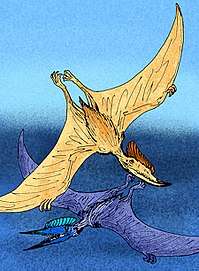Lianmuqin Formation
The Lianmuqin Formation[1] is an Early Cretaceous geologic formation composed of "interbedded red green and yellow variegated mudstones and siltstones".[2][3] Dinosaur remains have been recovered from it.[4]
| Lianmuqin Formation Stratigraphic range: Barremian-Albian | |
|---|---|
| Type | Geological formation |
| Unit of | Tugulu Group |
| Underlies | Donggou & Kumutake Formations |
| Overlies | Shengjinkou Formation |
| Thickness | 213–360 m (699–1,181 ft) |
| Lithology | |
| Primary | Mudstone, Siltstone |
| Location | |
| Region | Xinjiang |
| Country | |
The formation is named after Lianmuqin Town in Shanshan County, Xinjiang.
Vertebrate paleofauna
Dinosaurs
Color key
|
Notes Uncertain or tentative taxa are in small text; |
| Dinosaurs reported from the Tugulu Group | ||||||
|---|---|---|---|---|---|---|
| Genus | Species | Location | Stratigraphic position | Material | Notes | Images |
|
A. mongoliensis[5] |
| |||||
|
K. petrolicus[5] |
"Maxilla and dentary."[7] |
|||||
|
X. parvus |
"Tibia [and] phalanges."[8] |
Formerly thought to be a representative of Phaedrolosaurus ilikensis.[5] | ||||
|
P. ilikensis |
"tooth"[9] |
|||||
|
P. xinjiangensis[5] |
||||||
|
T. faciles[5] |
"Hindlimb, rib, [and a] vertebral centrum."[10] |
|||||
|
W. homheni[5] |
"Partial skeleton."[11] |
|||||
Pterosaurs
| Pterosaurs of the Lianmuqin Formation | ||||||
|---|---|---|---|---|---|---|
| Genus | Species | Location | Stratigraphic position | Abundance | Notes | Images |
|
D. weii[12] |
| |||||
|
L. acutirostris[13] |
Possible junior synonym of Dsungaripterus weii.[14] | |||||
|
N. complicidens[13] |
||||||
Crurotarsans
| Name | Species | Location | Stratigraphic position | Abundance | Notes | Images |
|---|---|---|---|---|---|---|
|
E. tienshanensis[15] |
||||||
See also
- List of dinosaur-bearing rock formations
References
- "Re: Kelmayisaurus a carcharodontosaurid". dml.cmnh.org. Retrieved 2015-01-05.
- Lucas, Spencer G, Chinese Fossil vertebrates, Pp. 158-159, New York, Columbia University Press, ISBN 0-231-08483-8.
- Lucas, S.G. (2001). Chinese Fossil Vertebrates. Columbia University Press. p. 158. ISBN 9780231084833. Retrieved 2015-01-05.
- Weishampel, et al. (2004). "Dinosaur distribution" Pp. 517-607. in Weishampel, David B.; Dodson, Peter; and Osmólska, Halszka (eds.): The Dinosauria, 2nd, Berkeley: University of California Press. 861 pp. ISBN 0-520-24209-2. " Pp. 517-607.
- "48.5 Xinjiang Uygur Zizhiqu, People's Republic of China; 1. Tugulu Group," in Weishampel, et al. (2004). Page 567.
- http://www.app.pan.pl/archive/published/app56/app20100125_acc.pdf
- "Table 4.1," in Weishampel, et al. (2004). Page 73.
- "Table 4.1," in Weishampel, et al. (2004). Page 78.
- Z.-M. Dong. (1973). [Dinosaurs from Wuerho]. Memoirs of the Institute of Vertebrate Paleontology and Paleoanthropology, Academic Sinica 11:45-52. [Chinese]
- "Table 4.1," in Weishampel, et al. (2004). Page 77.
- "Table 16.1," in Weishampel, et al. (2004). Page 345.
- "Re: The timing of stegosaur extinction". dml.cmnh.org. Retrieved 2015-01-05.
- Barrett, P.M., Butler, R.J., Edwards, N.P., & Milner, A.R. Pterosaur distribution in time and space: an atlas. p61-107. in Flugsaurier: Pterosaur papers in honour of Peter Wellnhofer. 2008. Hone, D.W.E., and Buffetaut, E. (eds). Zitteliana B, 28. 264pp.
- Andres, B.; Clark, J. M.; Xing, X. (2010). "A new rhamphorhynchid pterosaur from the Upper Jurassic of Xinjiang, China, and the phylogenetic relationships of basal pterosaurs" (PDF). Journal of Vertebrate Paleontology. 30 (1): 163–187. doi:10.1080/02724630903409220.
- Jinling Li (July 1985). "A revision of Edentosuchus tienshanensis young from the Tugulu Group of Xinjiang Autonomous Region" (PDF). Vertebrata PalAsiatica. 23 (3): 196–206. Retrieved 2015-01-05.
This article is issued from Wikipedia. The text is licensed under Creative Commons - Attribution - Sharealike. Additional terms may apply for the media files.

